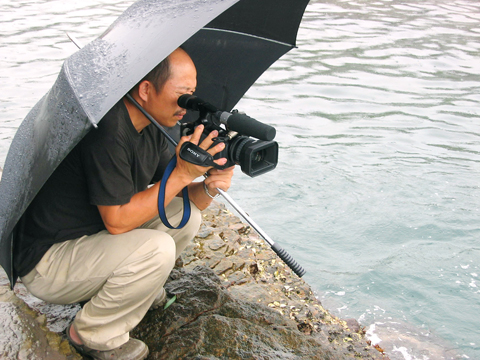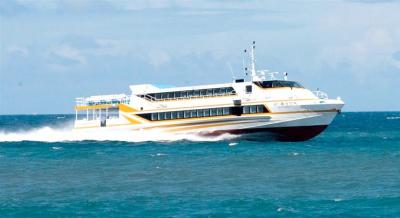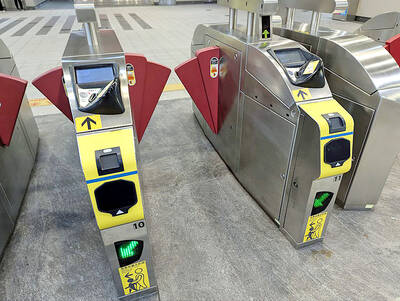On a cool rainy day in the middle of this month near the northeast coast of Taiwan, a group of volunteers checked their equipment on a rocky shore, before diving into the water with two fagots of bamboo to be used to create a “delivery room” for bigfin reef squid. The marine volunteers have been doing this since 1998, with the lens of a camera constantly trained on them for the past eight years.
Forty-six-year-old cameraman Ke Chin-yuan (柯金源) has been dedicated to environmental activities for more than two decades and has produced 11 environmental documentaries.
Ke, who started out as a journalist, made his first documentary in 1993, seeking to portray the environment from a perspective that differed from that of the mainstream media.

PHOTO: CNA
His work, which has become increasingly vital in light of the world’s environmental problems, shows his love for nature.
In Ke’s documentaries, humans play a central role, suggesting that their behavior cannot be separated from the cause and effect of environmental and ecological changes.
As Ke says in his latest documentary, released earlier this year, what people do unconsciously on the other side of the Earth can seriously affect Magellanic Penguins in coastal Argentina, Chile and the Falkland Islands.
“I pray in my heart that this scene of multitudes of penguins wandering near the coast will always exist,” Ke said in one of his documentaries that featured a voyage to the Antarctic.
Ke’s camera has focused on the interaction between humans and nature, especially on changes in primitive environments following human intervention. The images captured are sometimes of positive action — as in the case of volunteers’ efforts to protect squid — but more often they are negative, as when showing people capturing wild orangutans to train them to perform on TV shows.
“It is almost impossible to strike a balance between humans and nature. When the two sides come into conflict, humans have to concede — that is to say, not reclaim land in ecologically sensitive areas,” Ke said at a mountain barracks in northeastern Taiwan that serves as a base for marine volunteers.
In this rough shelter that lacks electricity and other basic necessities, the group of 10 divers and oceanology and marine life researchers gather regularly to plan the repopulation of bigfin reef squid.
Such is their passion for their work that two of the volunteers plan to get married undersea, near the squid “delivery room.”
Ten years ago, some of the divers found that bigfin reef squid were spawning among old fishing nets and trash because typhoons and artificial pollution had destroyed their usual spawning grounds.
With a plan in mind to save the squid, the divers built a “delivery room” during the April to September spawning season, using fagots of bamboo to simulate the environment of natural coral where the squid usually lay their eggs.
The idea proved successful, as a great number of squid came to the improvised bamboo grounds to spawn. Since then, the marine lovers have continued every year to construct new spawning grounds, as the bamboo deteriorates naturally over the course of a year.
On the day of the interview, Ke filmed two volunteers going underwater to add two bamboo fagots to the “delivery room.”
Since Ke’s documentary The Squid Daddy’s Labor Room was released last year, his interest in the project has not waned.
Expounding on the relationship between humans and nature, Ke cited Chingjing Veterans Farm as an example of humans gradually expanding their living place — starting in coastal areas and plains to medium, even high elevation areas destroying nature in the process.
The Chingjing Veterans Farm, located in Nantou County in central Taiwan at an altitude of about 1,800m, is famous for its grasslands and magnificent mountain views. A popular destination for tourists, the region is now dotted with legally and illegally constructed hotels and homestay accommodations.
Ke says that when a natural disaster occurs, it is an occasion for humans to reconsider their relationship with nature.
“What is a ‘natural disaster’? It is considered a disaster only when humans are hurt, otherwise it’s seen as just a natural phenomenon,” Ke said.
He sees people’s values as the fulcrum of environmental destruction. If people want a certain type of tourism, they request convenient transport and luxurious hotels, which encourages excessive development, he said.
Ke shows his dedication over the past 20 years to environmental education in local communities through his films, speeches and a personal blog, on which he records his observations on environmental and social issues.
He said that 20 years ago, a person was thought crazy if he or she talked about environmental protection, but now most people understand what environmentalists do.
“Also, the government is now considering practices that do less harm to the environment when it undertakes new construction plans, even though some of these plans are still environmentally harmful,” he said, adding that there has been some progress in environmental awareness in Taiwan.
“If the viewers gain a new understanding of the environment, a better idea of nature conservation, feel anger or joy when they look at my films, that is rewarding for me,” he said.
“Now that the idea of environmental protection is generally accepted, the next step is to create values and motivate people to take action,” he said.
“Then they will give priority to nature rather than to economic development when the two come into conflict,” he said.

Death row inmate Huang Lin-kai (黃麟凱), who was convicted for the double murder of his former girlfriend and her mother, is to be executed at the Taipei Detention Center tonight, the Ministry of Justice announced. Huang, who was a military conscript at the time, was convicted for the rape and murder of his ex-girlfriend, surnamed Wang (王), and the murder of her mother, after breaking into their home on Oct. 1, 2013. Prosecutors cited anger over the breakup and a dispute about money as the motives behind the double homicide. This is the first time that Minister of Justice Cheng Ming-chien (鄭銘謙) has

Ferry operators are planning to provide a total of 1,429 journeys between Taiwan proper and its offshore islands to meet increased travel demand during the upcoming Lunar New Year holiday, the Maritime and Port Bureau said yesterday. The available number of ferry journeys on eight routes from Saturday next week to Feb. 2 is expected to meet a maximum transport capacity of 289,414 passengers, the bureau said in a news release. Meanwhile, a total of 396 journeys on the "small three links," which are direct ferries connecting Taiwan's Kinmen and Lienchiang counties with China's Fujian Province, are also being planned to accommodate

TRANSPORT CONVENIENCE: The new ticket gates would accept a variety of mobile payment methods, and buses would be installed with QR code readers for ease of use New ticketing gates for the Taipei metro system are expected to begin service in October, allowing users to swipe with cellphones and select credit cards partnered with Taipei Rapid Transit Corp (TRTC), the company said on Tuesday. TRTC said its gates in use are experiencing difficulty due to their age, as they were first installed in 2007. Maintenance is increasingly expensive and challenging as the manufacturing of components is halted or becoming harder to find, the company said. Currently, the gates only accept EasyCard, iPass and electronic icash tickets, or one-time-use tickets purchased at kiosks, the company said. Since 2023, the company said it

Minister of Justice Cheng Ming-chien (鄭銘謙) yesterday authorized the execution of convicted murderer Huang Lin-kai (黃麟凱), the first death row prisoner to be put to death since President William Lai (賴清德) took office. Huang was to be executed via a firing squad yesterday evening, which would leave Taiwan with 36 convicts on death row. Huang on Oct. 1, 2013, broke into his ex-girlfriend Wang Ping-chih’s (王品智) residence in New Taipei City, where he raped and murdered Wang. He also killed Wang’s mother. Huang was bitter over the breakup and her accusation that he had stolen NT$200,000 (US$6,074) from her bank account, prosecutors said